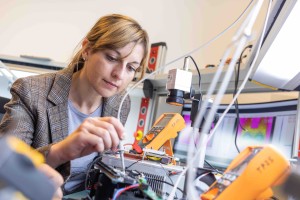International lecturer spoke at this years design month lectures “COMMON! Design for Society“, about current issues in media and technology in the context of social developments.
“Common! Design for Society“ was the title of this year’s design lecture series, part of the designmonat Graz and it took place at the Auditorium Joanneumsviertel. Five international lecturers from different fields of design gave talks about their work, their current projects and their experiences.
Tuesday, 14th of May 2019
Women in design. USSR 1917-Russia 2017
On the first day Alexandra Sankova covered the topic women in design through the moving history of Russia. Alexandra Sankova received her Master of Arts degree in Graphic Design from Stroganov Moscow State University of Arts and Industry. She is the General Director and co-founder of the Moscow Design Museum, which was established in 2012 with the mission to collect, preserve, and promote the design heritage of Russia.
She curated and co-curated exhibitions like Soviet Design 1950–1980 (2016, 2017) and Packaging Design. Made in Russia (2013), and: Discovering Utopia – Lost Archives of Soviet Design (2016), History of Russian Design 1917-2017 (2017, 2018), The Design System in the USSR and many others.
Liberate the User
Julianna Faludi, PhD is a sociologist researching topics like social innovation, relations between people and technology, and digital entrepreneurship. She is a coach and mentor at hackathons and digital startup projects collaborating with the Impact Hub and Makerspace in Budapest as well as the European Youth Award in Austria.
Her talk took stock of the role of design in generating and stopping processes of acceleration and overuse of Planet, Time and Social resources that have become commodities in the interactive space of value creation by the economic circuit. She discussed how technology can be used for setting the human spirit free by liberating the user and empowering the consumer by social innovation, which is a current quest for entrepreneurs as well as designers and scholars.
Designing Trust in an Era of Self Validating Facts
Who can we trust in and how do users invest their trust? Margot Bloomstein, principal of Appropriate, lnc., Boston tackled these questions. Independently and in partnership with leading agencies, she creates brand-appropriate user experiences to help retailers, universities and other organizations to engage their target audiences and communicate key messages with consistency and clarity. Over the past decade, she’s partnered with clients like BT, Philips, Tretorn, Lindt & Sprüngli, Harvard, Tufts University, Timberland, the state of Nevada, and the Rhode Island Public Transit Authority.
Day one closed with a general discussion amongst the participating speakers and the audience.
Wednesday, 15th of May 2019
Loving Strangers and the Built Environment
Rebecca “Bucky” Willis from Detroit was the first speaker on Wednesday, with her talk about how to use the built environment to spark love between strangers, foster altruism, and celebrate interdependency. “Bucky” is a native of Detroit, MI, and received her Master of Architecture degree from the University of Detroit Mercy.
She has worked for several non-profit organizations in Detroit, including Habitat for Humanity and Detroit Future City. Currently a project manager and designer at the Detroit Collaborative Design Center she also teaches at the Architectural DesignStudio and works as an adjunct professor at the University of Detroit Mercy School of Architecture.
Cell phones usually are an unwelcome disruption – but not this time: an unexpected sound performance happened between the two talks of day two. An orchestra of smart phones suddenly filled the room, arranged by Josef (Seppo) Gründler and students of the Sound- and Interaction Design master´s program.
Beyond the Golden Age of Pessimism
After even the last smartphone fell silent, Julia Kloiber, an alumni of the Information Design program at the FH JOANNEUM discussed how we can get beyond bleak sci-fi dystopias and focus on how technology and educated optimism can foster societal improvement.
Julia Kloiber is the Founder and Managing Director of Superrr Lab – a feminist think tank and consultancy and a Partner at Ashoka Germany. She develops strategies and concepts for innovations in the digital world. In 2016 she co-founded the Prototype Fund, Germany’s first public funding program for social innovation prototypes.
Two days of talks, discussions and critical analyses of contemporary media ended with a vivid exchange between all the participants after the last session.









